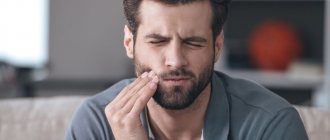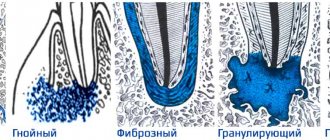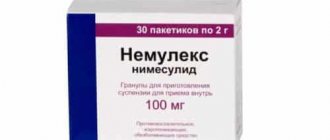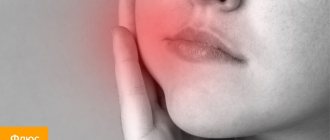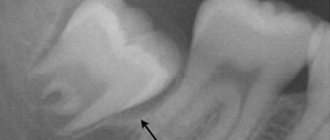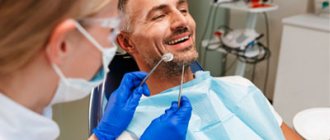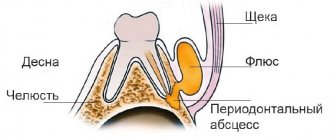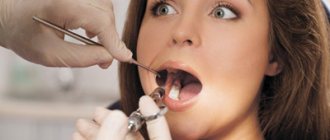Why do teeth hurt mostly at night and not during the day? This question interests a lot of people. Quite often, patients complain that the pain intensifies mainly at night. There are diseases that lead to the development of such ailments. Toothache develops due to the fact that the oral cavity contains a large number of nerve fibers, which become inflamed under the influence of various factors.
Common Causes of Pain
Experts identify the following diseases that lead to the development of toothache:
- Caries. The development of caries leads to damage to tooth enamel and dentin. In the resulting carious cavity, pathogenic microorganisms accumulate and rapidly multiply. When caries reaches a complicated stage, harmful bacteria practically reach the pulp, which is penetrated by nerve fibers. Pain syndrome occurs under the influence of irritating factors.
- Pulpitis. At this stage, damage to the pulp occurs, an inflammatory process develops in it, which spreads to all nerve endings. Painful sensations can occur without any external signs of disease.
- Periodontitis. With this disease, the inflammatory process develops in the tissues surrounding the tooth.
- Flux. This complication appears in the absence of timely treatment of pulpitis. The danger is that the developed inflammatory process spreads to the jaw and periosteum.
- Non-carious lesions of the enamel and hard layers of teeth. They arise as a result of mechanical damage to the tooth, resulting in destruction of the enamel. The main cause of pain with such a lesion is the same processes that occur during diseases.
- After the tooth filling procedure. When filling is performed incorrectly, when the specialist performs the manipulations incorrectly or does not follow the correct procedure, the patient may experience unpleasant pain, which intensifies mainly at night.
- After tooth extraction. Painful sensations that worsen at night may develop after tooth extraction.
General characteristics of the condition
Severe paroxysmal pain indicates inflammation of the pulp (the inner tissue of the tooth). The pulp is localized inside the dental canal. It consists of a nerve, connective tissue cells and blood vessels. The main task of the pulp is to deliver vital elements to the hard tissues of the tooth. Inflammation of internal tissues is called pulpitis. Most often it develops when an infection occurs after long-term caries.
Content:
- General characteristics of the condition
- Possible reasons
- How to provide first aid?
- Features of therapy
- Is it possible to prevent pain?
- Why does pain worsen at night?
Physiological processes
The most common factors that cause pain at night are physiological. Most often, this phenomenon is caused by a horizontal position taken during rest. In this position, blood flows intensely to the head, brain and jaws, which increases pressure on the inflamed tissues and nerve endings of the teeth. It should be noted that this process is not typical for all dental diseases. The most common cause of acute and severe toothache at night is pulpitis. At this time of day, excessive pressure forms in the inflamed pulp due to increased blood flow, and bundles of nerve fibers begin to send active signals to the central nervous system. Excruciating pain, mainly at night, can also occur with periodontitis and periodontitis.
Clinical picture
The key symptom of the disease is pain, but its nature can vary, as can the accompanying clinical signs:
- with pulpitis, the pain subsides during the day and increases in the evening, having a wave-like character and intensifying with physical contact of the tooth with any object;
- with periodontitis, the pain is more intense and does not subside for a minute, which is associated with damage to the bone tissue around the apexes of the roots. Damage to the ligamentous apparatus and the breakdown of nerve tissue not only causes discomfort, but also makes the tooth itself mobile, and any movement of it in the socket is accompanied by a new attack of pain;
- if the cause of the disease is an abscess, then the periodontium around it will differ from healthy tissue by the presence of edema and hyperemia, complemented by a feeling of pulsation in the gums. A localized abscess in some situations does not cause pain if the nerve endings have died, but this scenario can lead to the development of osteomyelitis.
Physiological factors
A separate group of reasons why patients experience toothache at night includes physiological factors:
- The time interval is from 00 o'clock to 5 am. This period of time is the most stressful and difficult for the entire human body. It is at this time that pain intensifies and sensitivity to any lesions and diseases, including dental ones, increases.
- Physiologists say that at night the vagus nerve called the vagus is activated, which has a large number of branches, some of which extend to the head area. The vagus affects the general condition and mood of a person. At night, the tone of the vagus nerve changes, which leads to increased sensitivity and pain.
- Also, based on the characteristics of the biorhythm, at night, even in a healthy person, blood pressure increases significantly. High blood pressure increases toothache.
Prevention of bruxism in children.
- Give your jaws a rest . Unless your child chews, swallows, or talks, the top and bottom teeth should not touch. If your teeth touch, they clench, which is just one step away from grinding. Explain this to your child and ask him to try to keep his teeth slightly apart when his jaw is relaxed.
- Encourage exercise . Regular exercise can help your child relieve stress and muscle tension, which can cause nighttime teeth grinding in susceptible individuals.
- Quiet activities before going to bed . The child should not take part in wrestling, active and violent games before going to bed. Tense muscles need time to relax before your baby falls asleep. Make sure that the child is in a calm state an hour before going to bed. During this time, you can read a book or let him read on his own or look through a picture book.
- Try putting your baby to bed earlier . Your child may be overtired, which may encourage him to grind his teeth while sleeping. In this case, going to bed earlier may help.
- Avoid eating before bed . If digestive juices are working during the night shift, this can lead to unnecessary stress for the child during sleep. Don't give your child anything to eat or drink other than water an hour before bedtime.
- Talk to your child about his problems . If your child is worried about a difficult assignment or the upcoming premiere of a school play, this may be the reason that makes him grind his teeth at night. If something is bothering your child, don't let him go to bed with that worry in his head. Talking to him before going to bed so that he can leave all his worries behind, this often helps relieve tension. Make a five- or ten-minute conversation with you a daily calming procedure before your child falls asleep.
- Apply warm, moist compresses . If your child's jaw hurts in the morning, soak a washcloth in warm water, wring it out, and apply it to the sore jaw until your child feels better. This will help soothe the pain.
Other lesions
Sometimes pain that is mistaken for a toothache may be due to the effects of other diseases. These include:
- Inflammation of the tertiary nerve can cause severe jaw pain at night. As a result of the influence of various factors, the nerve can be severely irritated, which leads to sensations that can easily be confused with toothache.
- If toothache is felt not only in the area of one tooth, but spreads throughout the entire jaw, then such phenomena may be symptoms of inflammation of the periosteum of the tooth, and even some ENT diseases: sinusitis, sinusitis and otitis media. In a horizontal position, the outflow of fluid from the sinuses is hampered, which increases the discomfort and spreads it to the entire jaw.
In some cases, toothache at night can occur for reasons that are not related to dentistry. For example, due to severe exhaustion of the nervous system, lack of sleep or regular smoking.
First aid
What can you do to get rid of toothache at night? The best option is to take an analgesic or non-steroidal anti-inflammatory drug (Ketanov, Ibuprofen, Tempalgin, Ketorol, etc.). Another option is to use ointments or gels that relieve pain and reduce inflammation - these include Metrogyl Denta, Solcoseryl, Asepta, and Cholisal.
"Ketorol"
You should not use antibiotics to get rid of toothache - a single dose of a tablet will not have the desired effect, and in addition, it can blur the overall picture of the disease. It is also not recommended to take drugs such as Analgin and No-shpa. The first has a large number of side effects, and the second is designed to relieve spasms, so it is simply ineffective for toothache.
"Analgin"
If there is a carious cavity in the tooth, you need to rinse your mouth, carefully clean the cavity and place a piece of cotton wool soaked in clove oil, hydrogen peroxide or lidocaine. In addition, you can use special dental drops (for example, Dentaguttal) - they contain valerian tincture, camphor oil and clove oil, due to which they have an analgesic and anti-inflammatory effect.
"Dentaguttal"
The simplest and most accessible remedy for night toothache is rinsing with a soda solution (a tablespoon in a glass of water, rinse every hour). Instead of a soda solution, sometimes a saline solution is used - dissolve a teaspoon in a glass of water, add 5-6 drops and rinse the affected area. This solution reduces inflammation and tissue irritation and relieves swelling well.
When you have a toothache, it is better to lie on high pillows so that the blood drains from the head and does not put pressure on the nerve endings, and to reduce discomfort, you can apply a cold compress to your cheek. But in such cases it is prohibited to heat the affected area - if the cause of the pain syndrome lies in the inflammatory process, heat can lead to the proliferation of pathogenic microorganisms and worsening the condition.
Cold compress
What to do if your tooth hurts badly at night
It should be remembered that all independent procedures will only help temporarily reduce pain and not eliminate the disease. The most common folk methods include:
- Painkillers. Such medications effectively help eliminate unpleasant symptoms, which alleviates the general condition of a person. The dosage of drugs should be taken according to the instructions. Overdosing on a medicine can cause serious problems.
- The use of tinctures of medicinal herbs for rinsing the mouth. The following herbs are suitable for these purposes: calendula, oak bark, calamus root, chamomile, plantain and sage. They have anti-inflammatory and antiseptic effects. Infusions should be used only if there are no allergic reactions to the herbs used.
- Rinse with salt solution. This solution helps to temporarily eliminate discomfort and make you feel better. It does not cause allergies.
If the temperature rises sharply or swelling occurs, this may be a sign of the spread of the inflammatory process. In such a situation, you must immediately seek the help of a specialist.
When should you see a doctor immediately?
When toothache occurs at night, most people try to postpone a visit to the doctor at least until the morning, but they often forget about the problem, especially if the discomfort subsides. This approach can lead to serious complications, including sepsis and other serious diseases; Moreover, there are a number of cases when a person needs medical care immediately.
At the dentist's office
It is necessary to call an ambulance or go to a 24-hour dental clinic in cases where toothache is accompanied by the following symptoms:
- severe swelling that spreads to one part of the face;
- temperature increase;
- difficulty swallowing or breathing;
- numbness or loss of sensation in the affected part of the face;
- severe headache, dizziness, rapid heartbeat.
Cheek swelling
In addition, it is necessary to immediately consult a doctor in cases where nighttime toothache constantly intensifies and is not relieved by painkillers.
Visit to the dental office
When visiting a dental clinic, the specialist will conduct a thorough examination of the oral cavity, then prescribe the patient to undergo an x-ray examination. Images are necessary to determine the extent of tissue damage, detect the source of inflammation and make the correct diagnosis. Treatment of deep caries and pulpitis is carried out using the same methods. During treatment, the doctor:
- Provides local anesthesia by injecting an anesthetic into the tissue surrounding the diseased tooth.
- Eliminates affected tissue.
- Performs mechanical and antiseptic treatment of canals.
- Performs canal fillings.
- Takes a control photograph of the tooth.
- Restores the damaged part of the tooth.
After undergoing treatment for deep caries or pulpitis, the patient may still feel discomfort and unpleasant sensations for some time, which should subside over several days. In case of periodontitis and periostitis, it is initially necessary to eliminate the source of infection. To do this, root canals are cleaned and processed. Treatment of gumboil and periodontitis takes longer. After eliminating the source of infection, the canals are filled and the crown of the tooth is restored. Sometimes surgical methods are used to treat flux. If you ignore the problem and do not seek the help of a dentist, then the chances of saving the tooth are greatly reduced. If acute toothache occurs due to the eruption of the eighth tooth, then it is very important to promptly seek the advice of a specialist. After examining the oral cavity and conducting an X-ray examination, the doctor will select the most effective treatment method in each specific case. The dentist begins performing therapeutic procedures after administering local anesthesia. Modern anesthetics are highly effective and well tolerated by the body.
Pain in the right hypochondrium
If there are problems with the discharge of bile, the pain is usually concentrated in the right hypochondrium, can radiate to the right collarbone, and is sometimes accompanied by nausea. The cause of such pain may be disorders of the biliary tract, cholelithiasis or cholecystitis. Less commonly, discomfort in the right hypochondrium can accompany inflammation of the liver (hepatitis).
If you have pain in the right hypochondrium, you should consult a gastroenterologist. He will prescribe an ultrasound of the abdominal cavity, check the condition of the liver and prescribe appropriate treatment.
Without a doctor’s examination, it is strictly forbidden to carry out treatment with “traditional” methods, including the so-called liver cleansing. If a patient with gallstones begins the “cleaning”, the stones can come out of the bladder, get stuck in the ducts and cause severe jaundice.
Oral care
After treatment and elimination of painful sensations, to prevent such situations in the future, you should adhere to the following mandatory rules:
- Carry out regular, thorough cleaning of your teeth and gums with a brush and paste. Use additional hygiene products in the form of rinses, flosses and irrigators.
- undergo regular preventive examinations with a dentist.
- It is extremely important to eat right. To do this, you need to reduce the amount of sweets, confectionery and sweet carbonated drinks you consume. It is important to balance your diet with as many fruits, fresh vegetables, and herbs as possible.
- try not to smoke or drink alcoholic beverages. Nicotine negatively affects the entire human body. People who smoke develop pigmented plaque on their teeth, which provokes the development of gingivitis and periodontitis. Alcohol reduces immunity and contributes to the development of mucosal dystrophy.
- carefully monitor and be attentive to your health!
Prevention of dental diseases
Preventive methods for dental diseases are very simple. It is necessary to maintain daily oral hygiene, visit the dentist 1-2 times a year, and monitor your diet.
If you are a smoker with or without experience, or a big fan of strong tea or coffee, be prepared for the fact that preventative cleaning will need to be carried out more often. Dental plaque is an ideal environment for the proliferation of pathogenic flora and, accordingly, the occurrence of inflammatory lesions on the teeth and in the mouth.
Food must contain sufficient amounts of phosphorus and calcium, vitamins, and microelements. Improper nutrition will lead to rapid destruction of dentin and tooth loss.
Particular attention to these factors should be paid to those who are prone to periodontal disease and periodontitis or are already sick with them.
Author: Elena Kopylova Dentist-therapist, endodontist, pediatric dentist. Work experience more than 7 years. The information is for reference only. Before treatment, consultation with a doctor is necessary.
Differential diagnosis
Differential diagnosis is based on the features of the clinical picture of the disease. For example, with ankylosing spondylitis there are no lesions of symmetrical joints and rheumatoid nodules characteristic of rheumatoid arthritis. Rheumatoid arthritis causes joint deformity, but rheumatoid arthritis does not. A duodenal ulcer can be suspected in the presence of dyspeptic symptoms, and pyelonephritis can be suspected in the presence of concomitant urological disorders with systemic manifestations of malaise and fever. Immunopathological diseases are mainly diagnosed by laboratory methods. Dystrophic and degenerative - instrumental.
It is necessary to conduct a comprehensive diagnosis to accurately determine the pathology
Dental consultation
Careful dental care and regular visits to the dentist are the key to good health. Inexpensive dental treatment and effective treatment results at the ARTE-S center ensures excellent condition of the dental system for each client. The dentist finds the triggering factors for night pain and offers the patient an optimal treatment regimen.
- In pulpitis, when there is aching discomfort or throbbing tenderness, the unit is opened and the pathological tissue is removed. An x-ray is taken. The photo will show the shape and length of the canals. After cleaning them, a filling is installed.
- Acute pain accompanies periodontitis, especially with mechanical loads. After professional cleaning, drug therapy and sanitation are prescribed; radical measures and prosthetics may be required.
- Dull, unpleasant sensations are characteristic of periodontal disease. To remove the symptoms of the disease and improve tissue nutrition, you first need to cure caries, remove dental plaque, and carry out medication and physical therapy. Ultrasound and splinting are also used, and operations are prescribed according to indications.
Instant pain is characteristic of injured masticatory organs. In case of dislocation, therapy is prescribed and splinting structures are applied. If the pulp is dead, endodontic treatment is necessary. When a crown is fractured, it is restored using inlays, artificial crowns, and composite materials. When the root is fractured, most often the unit is removed and a pin is installed.
Prevention and treatment
Absolutely all people who have problems with the spine are recommended to have a hard sleeping surface and a properly chosen pillow. This allows you to maintain correct posture. Bed linen must be of high quality and non-synthetic. Synthetics create static electricity, which can promote involuntary muscle contractions. Muscles that are tense at night will hurt in the morning.
The diet depends on the cause of back pain. If you have gout, you will have to limit foods rich in purine, and if you have osteoporosis, foods should be rich in calcium. Another preventive measure is wearing comfortable shoes. It is recommended to walk in heels for no more than two hours. It is useful to practice swimming and yoga, and drink filtered water.
Therapeutic massage, physiotherapy, physical therapy are prescribed only by a doctor. For example, manual therapy is contraindicated for cardiovascular diseases, infectious diseases, and old age. And acupuncture is used for kidney diseases, pregnancy, and acute respiratory diseases. Acupuncture is very effective for psychosomatic pain.
How treatment will be carried out depends directly on the diagnosis, since a separate approach is used for each disease
Regarding medications, it is important to mention that for each disease the medications will be different, so you should not generalize or take the first painkiller you come across. It is necessary to find out exactly the cause of this problem and only then decide on the drug. Although, of course, it is better to do this with a specialist who, based on the patient’s tests, will accurately determine the appropriate remedy.
It is also not always worthwhile to be treated with the help of folk remedies - there is a high probability of harming yourself, because a certain remedy can be harmful for a particular organ. Moreover, a person may not know that he is allergic to some component of a folk remedy - then when using it, the patient’s situation will worsen even more.
Video - Exercise to get rid of back pain at night
Anatomy
First of all, it is necessary to clarify what belongs anatomically to the back. This is necessary in order to represent the projection of the internal organs and exclude their disorders as the cause of pain. The back is the back side of the torso (the torso is the part of the body that does not include the head, neck and limbs). The upper border of the back is the cervical region, the lower - the lower back. The back is formed by the vertebrae, the back of the ribs and soft tissues. The so-called retroperitoneal space extends from the diaphragm to the small pelvis. The organs located in it are surrounded by fatty tissue.
Back pain can be caused by various reasons, which can be associated with both the locomotor system and internal organs.
The retroperitoneal (retroperitoneum - retroperitoneal space) includes: kidneys, adrenal glands, ureters, ascending and descending colons, descending and horizontal parts of the duodenum and pancreas (the retroperitoneal space also contains great vessels). Any disturbances in the structures that form the wall of the back of the body and in the organs that project to the dorsal region can cause back pain.
Pain in the left hypochondrium
Pain in the left hypochondrium usually occurs with pancreatitis. The pain is usually dull or aching. They are noted in the upper and middle parts of the abdomen, as well as in the left hypochondrium. At the time of exacerbation, the intensity of pain increases significantly. Quite often, during an exacerbation of chronic pancreatitis, girdle pain in the abdomen is observed, which spreads from the left hypochondrium to the back. Deterioration of chronic pancreatitis usually occurs after drinking alcohol, fatty or spicy foods.
In case of exacerbation of chronic pancreatitis, it is necessary to create rest for the pancreas as quickly as possible. If the pain is very severe, you need to refuse food, call a doctor and apply ice to the upper abdomen in the epigastric region. It should be remembered that the ice should not come into direct contact with the skin, and the duration of the procedure should not exceed 15-20 minutes for each subsequent hour. If the pain is of moderate intensity, you should visit a gastroenterologist as soon as possible.

